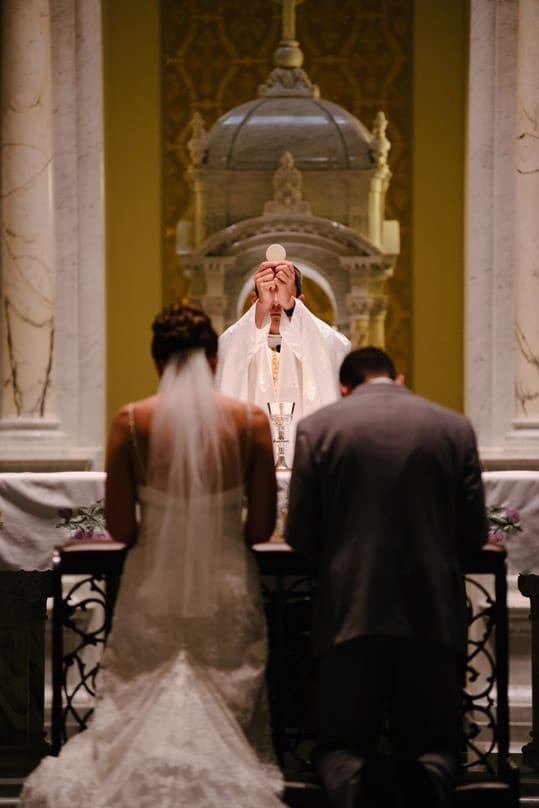
There have been several recent interventions by prominent Catholics arguing that it is compatible with their faith to voting Yes in the postal survey.
Fr Frank Brennan SJ has claimed that it is consistent with the Church’s teaching on the common good for a Catholic to vote for changing the legal definition of marriage to include same-sex relationships.
Greg Sheridan more recently has argued that the moral teaching of no lesser figure than St Thomas Aquinas, a doctor of the Church, can be found to support a change in the legal definition of marriage.
The arguments are based on the notion that Catholics can maintain their religious or theological view on marriage as sacramental between one man and one woman, while supporting a change to civil marriage to include same-sex couples.
Given that both Brennan and Sheridan have made their respective proposals from the point of view of Catholic faith. Perhaps it’s appropriate to test their claims.
Let’s imagine that we are speaking to Brennan and Sheridan as believers, as brothers in, and held accountable to the same faith.

From this angle, how do their proposals measure up to what the Catholic faith qua Catholic faith actually binds us to? Can the Catholic, in faithfulness to what the Church actually teaches, embrace a civil law that permits same-sex couples to marry?
On paper, it’s actually quite clear (unless of course you think of the Church’s formal doctrinal teachings as outdated and irrelevant––but that’s a separate question).
Strictly from a canonical and magisterial perspective, deviations from the Church’s basic understanding of marriage, even in a civil context, is regarded as a grave matter.
In a recent response to Brennan’s claims, American canonist Edward Peters did a round-up of the relevant canons on marriage, and concluded:
… for a Catholic to endorse any other kind of union (same-sex, group, inanimate objects, etc.) as a form of marriage is for that person to be “opposed to the doctrine of the Catholic Church” (1983 CIC 750 § 2) rendering him or her liable to a just penalty (1983 CIC 1371 n. 1). Moreover, if, as seems to be the case, the divine establishment of marriage as uniting one man and one woman is a “revealed truth”, then a Catholic’s endorsement of any other kinds of unions as marriage is actually heresy (1983 CIC 750) in turn rendering a Catholic liable to even more severe ecclesiastical sanctions including excommunication (1983 CIC 1364 § 1), expulsion from religious life (1983 CIC 696 § 1), and dismissal from the clerical state (1983 CIC 1364 § 2).
This might all sound dreadfully legalistic and casuistic, but 1) if you’re a Catholic, you’re obliged to submit to it and 2) there is a deeper non-legalistic and non-casuistic rationale for this strictness.

Why such demanding restrictions for Catholics, even as regards purely civil marriage?
Civil marriages between a man and woman are recognised by the Church as real unions, even in their so-called “secular” (that is, non-religious) character.
According to Catholic teaching all such unions belong to a more constitutive pre-political “order of creation”. The Church has typically expressed this by appeals to a “natural law,” as a subset of an “eternal law” from which this “order of creation” acquires its normative and universal character.
A validly contracted natural or “civil” marriage between a man and a woman (that is, a marriage taken up outside of the sacramental and canonical regulations of the Church) is also a real marriage on the basis that it belongs to the enduring integrity of this original “order of creation.”
A Catholic cannot therefore support re-defining civil marriage to include same-sex couples. This is not a matter of prudential judgement or conscience. The Church is clear that such a change to the civil law contravenes the basic givens of the created order as understood by faith.
Legislating for something in direct opposition to the natural and Divine moral law has not the nature of law according to Aquinas but that of violence. It is one thing to tolerate those things inconsistent with the moral law; it is another thing entirely to legislate in favour of them.
For Catholics such as Brennan and Sheridan it is incompatible with their faith to support the redefinition of civil marriage to include same sex couples. While they might still seek to advocate a “yes” vote it needs to be clear that this would involve dissenting from Catholic teaching and place one in an irregular relationship with the Church.
